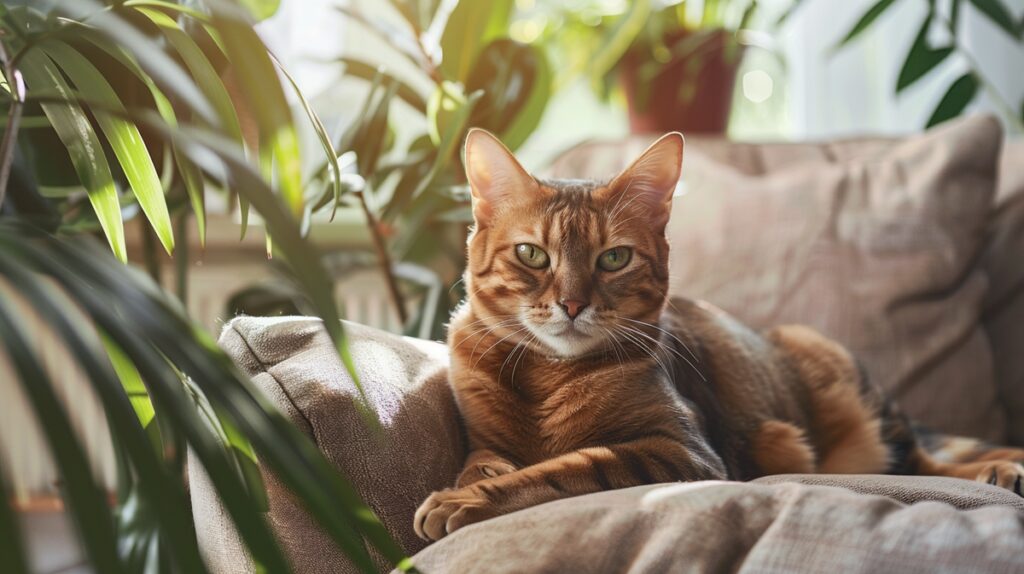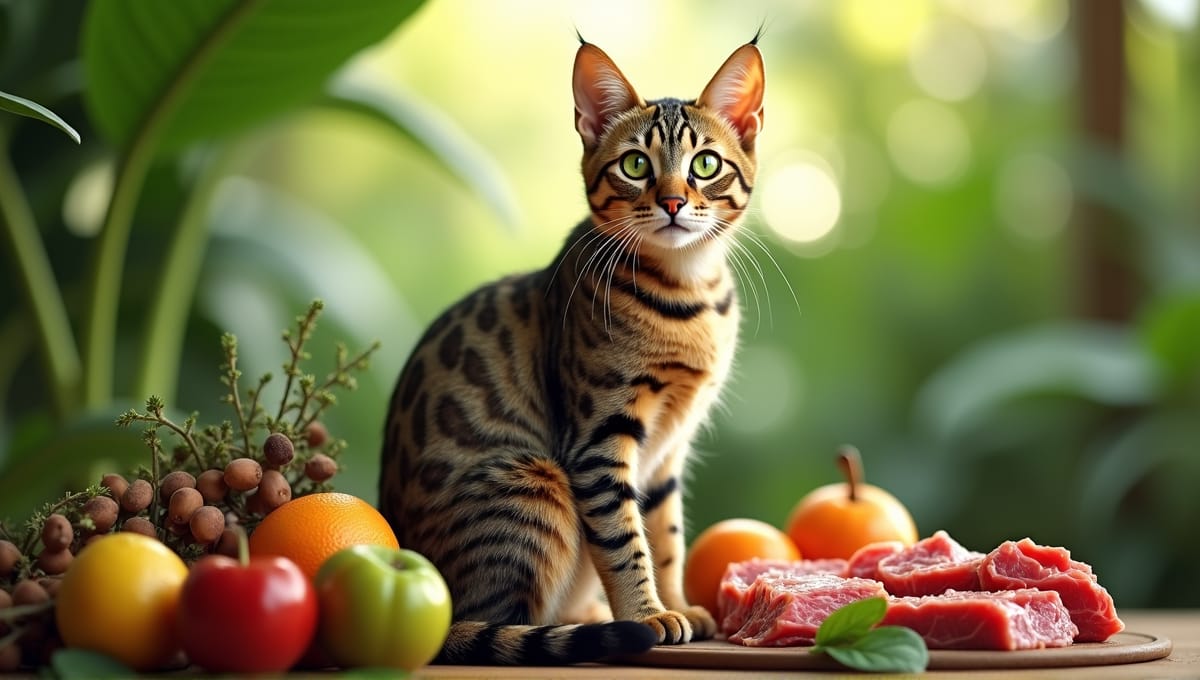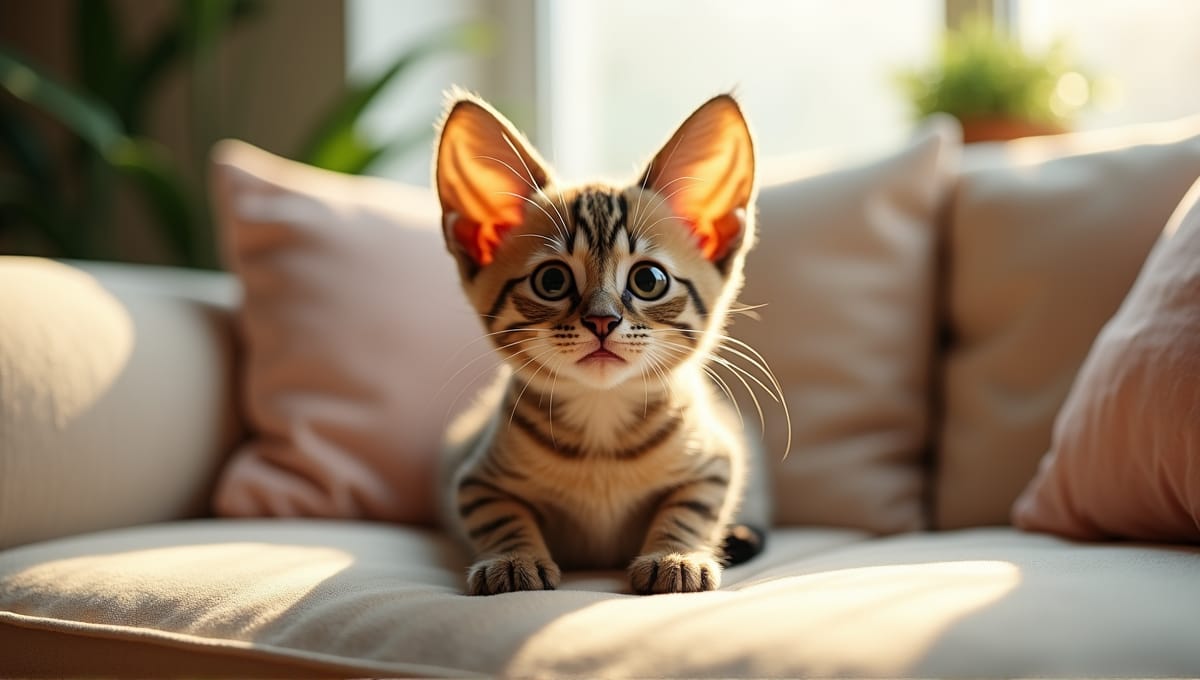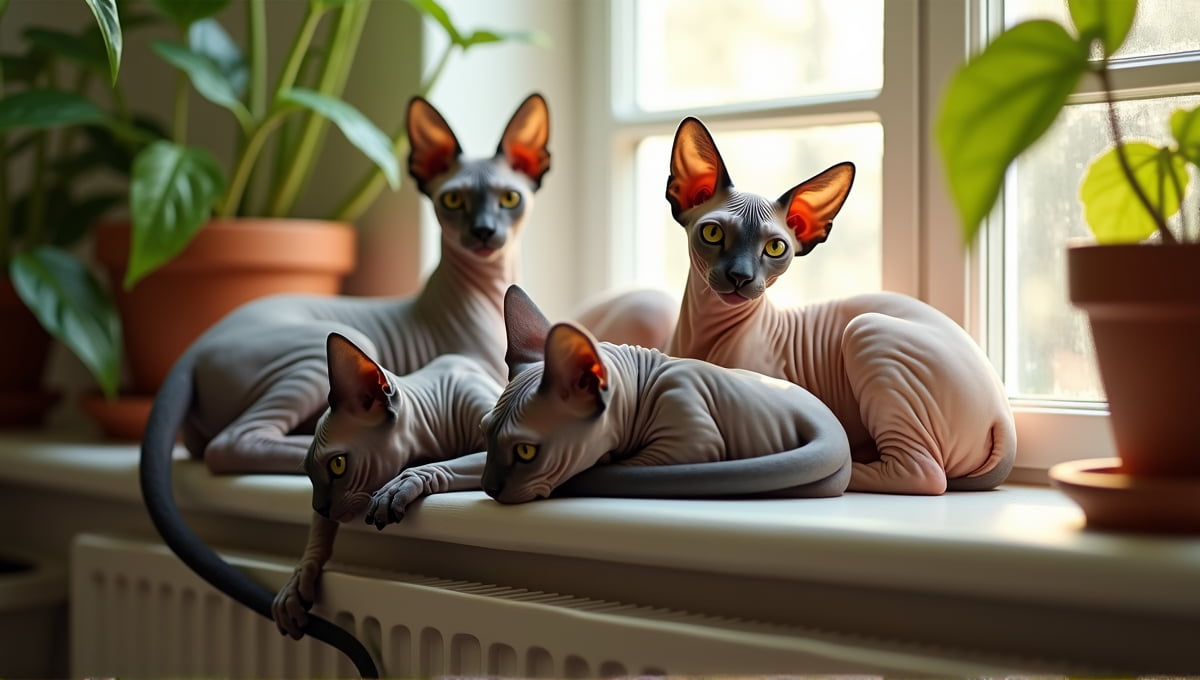Exotic cat breeds are a fascinating combination of wild elegance and distinctive characteristics. However, that doesn’t mean they’re the right fit for your home. I’ve been a cat lover all my life, and I’ve witnessed both the appeal and the drawbacks of these remarkable cats.
They have special care considerations, care requirements, and legal limitations. So, is an exotic cat the right choice for your family?
Popular Exotic Cat Breeds
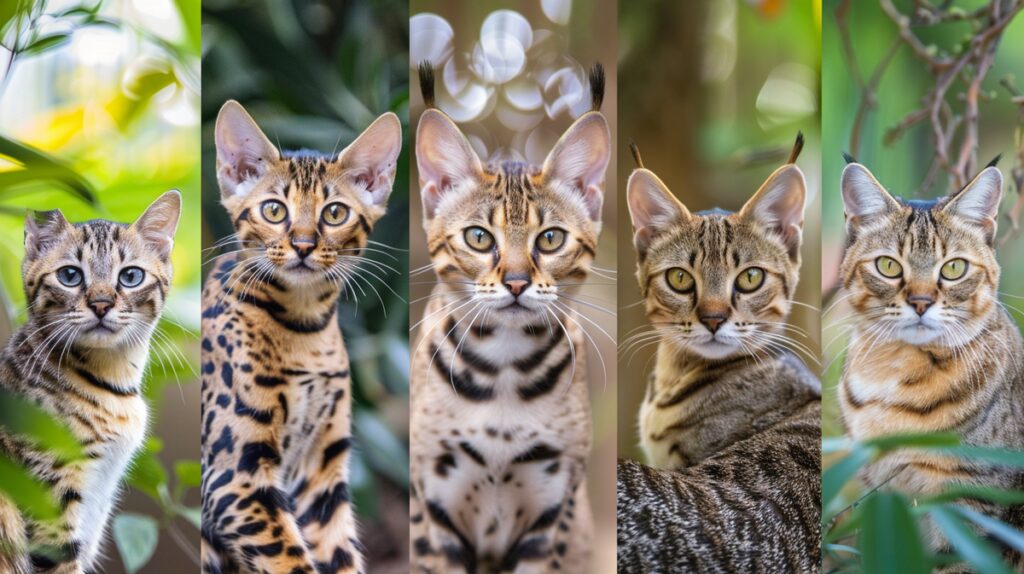
Exotic cat breeds are beloved for their unique appearance and behavior. Here are some of the most popular exotic cat breeds who often steal the spotlight in any household:
Savannah Cat: A cross between a domestic cat and an African Serval. They’re slender, tall, and spotted. Savannah cats are extremely loyal and have a lot of energy, almost like a dog.
Bengal Cat: Similar to a miniature leopard. You can find them with rosettes or marbling on their coat. Bengals are a very playful breed and they often enjoy playing in water.
Sphynx Cat: These cat breeds are famous for their lack of fur. They’re also wrinkled and come in a variety of colors and patterns. Sphynx cats feel warm to the touch and they’re extremely loving.
Scottish Fold: Instantly recognizable by their folded ears. They have a round face and look adorable. Scottish Fold cats are docile and they’re also good at adapting to new environments.
Maine Coon: This domestic cat breed is one of the largest you can own. They have long hair and tufts in their ears. Maine Coon cats are known as gentle giants and they’re also very friendly.
Each breed has its own standout qualities that make it the perfect pet for certain individuals.
Physical Characteristics of Exotic Cats
Exotic cat breeds are known for their unique and often quite striking physical appearances. These cats exhibit a wide variety of coat patterns and textures, body sizes and structures, and coat lengths.
The size differences can be quite substantial. For example, Maine Coon cats can weigh over 18 pounds, whereas a Sphynx might only weigh 9 pounds. Savannah cats are exceptionally tall and very lean, standing up to 17 inches tall at the shoulder.
Coat patterns and textures are also extremely different from one another. Bengals have short coats with leopard-like rosettes, while a Sphynx has no coat at all, revealing wrinkled skin. Maine Coons boast long, shaggy coats designed to keep them warm in cold climates.
Many of these cats have very unique facial features. Scottish Folds have a distinct owl-like appearance thanks to their folded ears, which are truly one of a kind. Additionally Savannah cats still have a wild look thanks to a combination of their strong bone structure, high cheekbones, and large ears.
| Breed | Size | Coat | Distinctive Feature |
|---|---|---|---|
| Savannah | Large | Short | Tall, lean and animal-like |
| Bengal | Medium | Short | Wild animal-like |
| Sphynx | Medium | Hairless | Very wrinkly skin |
| Scottisk Fold | Medium | Short/long | Folded ears |
| Maine Coon | Large | Shaggy | Ear tufts |
These are the unique physical characteristics that make exotic cats truly stand out. They are often excellent conversation pieces and owners are often quite proud of their interesting cat.
Temperament and Personality Traits
Exotic cat breeds often have personalities that are just as unique as they are. And you’ll probably find that their behavior varies significantly from breed to breed.
Sociability:
- Savannah cats are commonly referred to as the most loyal, dog-like cat.
- Bengals are often very social and may demand all of your attention.
- Sphynx cats commonly show extreme love to their owners.
Intelligence and ability to train:
- Many exotic breeds, such as Savannahs and Bengals, can learn tricks.
- Many cats of these exotic breeds enjoy puzzle toys and interactive play.
- Some cats of these breeds can be trained to walk on a leash.
Energy/playfulness:
- Savannah and Bengal cats are both high-energy cats that require a lot of play.
- Maine Coons are generally playful as well, though they’re a lot less intense.
- Scottish Fold cats are usually calmer and more laidback.
Family and other pet compatibility:
- Maine Coons are often good with both kids and other pets.
- However, a Bengal might be a bit too much for a young child.
- Savannah cats can be territorial and don’t always get along with other cats.
Because of these various characteristics, exotic cat breeds are fascinating pets. However, it’s important to select a breed based on your own lifestyle and personality. For instance, a Bengal cat won’t be happy in a calm, quiet environment. And a Sphynx cat will likely become sad if you’re away a lot of the time as they crave human contact.
Care Requirements for Exotic Cat Breeds
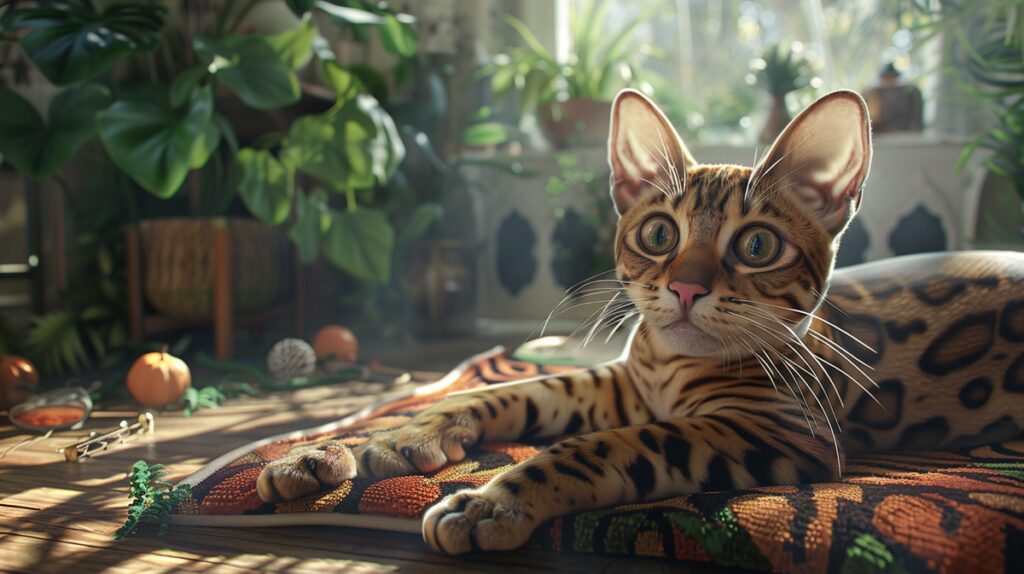
Caring for exotic cat breeds, whether it’s a Bengal cat, Sphynx cat, or another exotic breed, requires dedication and expertise because they have unique needs that you must fulfill to ensure they stay healthy and happy.
Their dietary needs will vary, as Savannahs and Bengals might require a high-protein diet. Sphynx cats have high metabolisms and might require more frequent meals. Always consult a veterinarian to determine the best diet.
Grooming needs:
- Sphynx cats need regular baths to remove oil from their skin.
- Maine Coons, another exotic breed, will require regular brushing to avoid matted fur.
- Bengals and Savannahs are relatively low-maintenance in terms of grooming.
Exercise and enrichment is critical. Make sure you have:
- Tall cat trees for them to climb.
- Interactive toys to keep their minds active.
- Regular playtime to burn off energy.
Regular health checks are also crucial. Monitor them for:
- Changes in eating or drinking.
- Odd behavior or sluggishness.
- General signs of illness.
Space requirements is also a key consideration. Most Savannah cats and other exotic breeds of cats will require:
- A lot of room to roam and explore.
- Vertical spaces, like shelves or cat trees.
- Outdoor enclosures if possible.
Always remember that exotic breeds of cats will have unique care needs, and it’s your responsibility to understand and meet those needs.
Potential Health Issues in Exotic Cats
Exotic cat breeds may be more susceptible to certain health issues, and it’s important to know about these problems before you decide to add an exotic cat to your family.
Most exotic breeds have breed-specific genetic conditions. For example, Scottish Folds suffer from skeletal issues thanks to the gene that gives them folded ears. Bengals can develop heart issues.
These are examples of breed-specific genetic health issues. Nearly all exotic breeds are prone to the following health issues:
- Respiratory issues in flat-faced breeds
- Digestive sensitivities
- Dental issues
The key to managing breed-specific and common health problems in exotic breeds is regular preventive care. This means regular check-ups, vaccinations, dental cleanings, a proper diet, and exercise.
| Breed | Common Health Issues |
|---|---|
| Savannah | Hip dysplasia, hypertrophic cardiomyopathy |
| Bengal | Progressive retinal atrophy, heart disease |
| Sphynx | Skin conditions, heart disease |
| Scottish Fold | Osteochondrodysplasia, ear infections |
| Maine Coon | Hip dysplasia, hypertrophic cardiomyopathy |
The more check-ups, the better. Because exotic breeds are slightly more suspicious to health issues, the more check-ups, the better. Visit your veterinarian and listen to their recommendations to keep your exotic animal as healthy as possible.
Many exotic cats live perfectly happy and healthy lives because their owners put the work in to take them to the vet. However, you’re likely to spend more money at the vet if you’re on the lookout for breed-specific and common health issues.
Don’t be too scared to become an exotic cat owner, but I would simply budget a little more for potential veterinary costs.
Legal Considerations for Owning Exotic Cats
Owning an exotic cat is subject to legal regulations. You should research the laws in your area before making a purchase.
State and local laws vary widely. Some prohibit specific breeds altogether and others may require special permits or have strict housing regulations.
Permit regulations are commonly stringent and may include:
- Evidence of suitable enclosures
- Regular vet exams
- Liability coverage
Breed restrictions also vary depending on location. For example:
- Servals are banned in 5 states (even with a permit) and legal with permits in 6 states
- Caracal Cats are banned in 3 states (even with a permit) and legal with permits in 1 state
- Ocelots are banned in 13 states (even with a permit) and legal with permits in 5 states
- Canadian Lynx and Siberian Lynx are either banned or legal with permits in 8 states
- Bobcats are either banned or legal with permits in 3 states
- Asian Leopard Cats are either banned or legal with permits in 6 states
Ethical concerns are another consideration. Assess the cat’s potential quality of life and consider the impact on local wildlife if it ever escapes.
Always verify current laws prior to owning an exotic cat. Legislation can change, and you don’t want to risk facing legal consequences or giving up your pet.
Pros and Cons of Owning Exotic Cat Breeds
Owning an exotic cat breed can be fulfilling, though it’s not right for everyone. Consider the pros and cons of exotic cats before you decide to bring one home.
Pros of exotic cat breeds:
- Unique, beautiful look
- Often very intelligent and trainable
- Very loving and loyal
Cons and potential downsides:
- Specialist care and diet requirements
- Increased likelihood of some health problems
- Not legal in all locations
It’s worth taking financial costs into account. Exotic breeds tend to have:
- Higher purchase prices
- Higher vet bills
- Specialist food items and care products
They also require a significant long term commitment, as these cats can live 15-20 years, or even longer. Make sure you’re willing to commit for their entire life.
| Pros | Cons |
|---|---|
| Unique appearance | Potential health problems |
| High intelligence | Legal restrictions |
| Strong bond with owners | Higher costs |
| Conversation pieces | Specialist care needs |
I’ve seen people who have successfully owned an exotic cat, and others who have struggled. It really comes down to the owner’s willingness to commit and ability to meet the cat’s needs.
Exotic cats are incredibly intriguing with their beautiful, wild appearance and special characteristics. They require specific care, a serious commitment and significant resources. So, they’re not suitable for everyone. Yet they form a connection with the perfect owner like no other animal can.
I’ve seen the happiness they bring, and I’ve seen their downsides. Therefore, choosing to invite an exotic cat into your world is a very personal decision. Do your research. Seek advice from professionals. Evaluate your daily life. Then you can determine if an exotic cat is the best fit for you.


